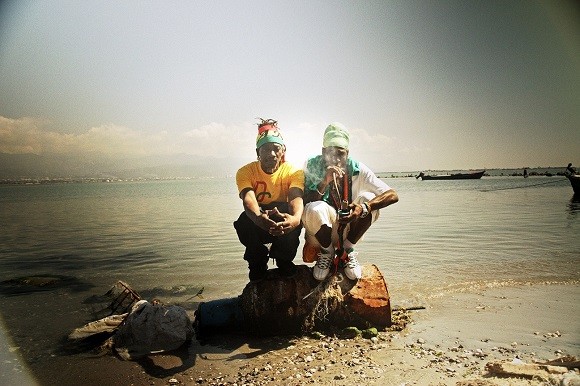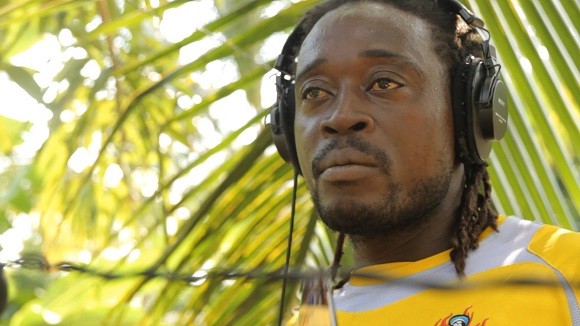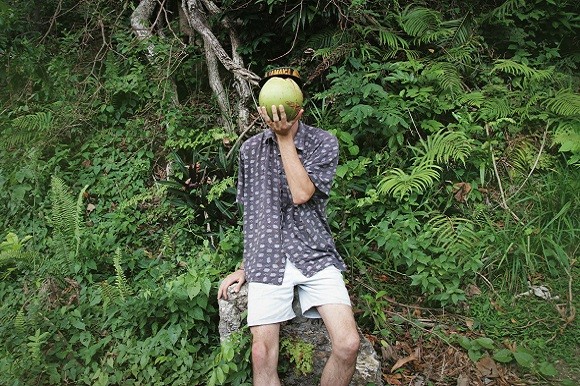Sun Araw & M. Geddes Gengras Talk Duppy Gun, Jamming, and The Congos

The first thing I learned from talking to Sun Araw (a.k.a. Cameron Stallones) andM. Geddes Gengras, both Los Angeles-based, free-form weirdos, is that you can actually set up a three-way phone call without video. Who knew?
Stallones and Geddes were responsible for one of the most stunning records of last year, a collaboration with The Congos called Icon Give Thank, released through RVNG Intl. I spoke to them at length two weeks ago about their upstart dub imprint Duppy Gun, born out of their first visit to Jamaica for the Thanksessions. The pair then launched Duppy Gun out of pocket with a massive collaboration between dancehall mainstays Dayone and Early One in tow. What followed over the next year and a half was something of a musical pilgrimage, with Stallones and Geddes taking homemade psychedelic riddims to Jamaica and letting select MCs and vocalists go wild on a track of their choice. They pressed their first record in a batch of 480, but both tunes were solid enough to catch the ear of legendary hip-hop and tastemaking imprint Stones Throw. Stones Throw gave the go-ahead for more of the releases, and over time, Duppy Gun has transformed from a small labor of love and into a spotlight for both underground Jamaican artists and established producers in disguise. Now if there was only a way to get Jamaican music on American radio...
The following interview was a pleasure to conduct, with the pair diving deep into the creative process behind Duppy Gun, the rush of joy and adrenaline of performing with The Congos, and a few tidbits about their upcoming solo projects. All the Duppy Gun releases will be spotlighted throughout, along with exclusive photos from filmmaker/DJ Tony Lowe, who was behind the camera for the documentary on Icon Give Thank.

-- Taken from DPPY001
Ad Hoc: DPPY001 came out in November, 2011, after you went to Jamaica to record with The Congos. Is that where all this started?
Cameron Stallones: Yeah, definitely. The way it works is when there’s a musician in town, or a producer in town, or anything like that, the music community kind of tends to congregate. You show up and try to get on a track or try to play on the record or whatever’s happening. So we kept getting approached by these guys who were saying, “Let me get on the track,” or “Let’s do something.” We were busy working on the Congos album so...for a while we were like, “Uh, working on this other thing.” Then we met these guys, and we ended up taking them into the studio and playing them some little pieces and jams that we had that we weren’t planning on using for the Congos record. Stuff that mostly we thought was too weird or not finished enough, and these guys were immediately jumping on it and just spitting fire all over it. So we were all, “Alright, well, this is really cool. Let’s continue this.” So that’s how we recorded the first single, which was the “Earth,” with Early One and Dayone.
Cameron Stallones: Yeah, definitely. The way it works is when there’s a musician in town, or a producer in town, or anything like that, the music community kind of tends to congregate. You show up and try to get on a track or try to play on the record or whatever’s happening. So we kept getting approached by these guys who were saying, “Let me get on the track,” or “Let’s do something.” We were busy working on the Congos album so...for a while we were like, “Uh, working on this other thing.” Then we met these guys, and we ended up taking them into the studio and playing them some little pieces and jams that we had that we weren’t planning on using for the Congos record. Stuff that mostly we thought was too weird or not finished enough, and these guys were immediately jumping on it and just spitting fire all over it. So we were all, “Alright, well, this is really cool. Let’s continue this.” So that’s how we recorded the first single, which was the “Earth,” with Early One and Dayone.
M. Geddes Gengras: I kind of had a long-term obsession with dancehall. You see a different side of performance and of musicianship over there. And also working with young guys who are younger, and more unknown, more trying to get their careers off the ground-- it’s a very different experience.
Ad Hoc: How many tracks did you have prepared when you went down to Jamaica the first time?
MG: All the stuff we brought with us for the Congos record, which was everything that’s on that album and then about three or four loose sketches we had started working on. I think we pretty much used everything we came down with on that trip.
CS: Then we went back for our first trip that was just focused on Duppy Gun, and we brought down about...what was it, twelve riddims or something?
MG: Yeah, twelve or fifteen.
CS: Yeah, something like that. And these were all completed. We farmed them from friendly producers here and far, and also made probably about half of them ourselves.
Ad Hoc: How do you typically work on tracks together in LA?
CS: Rarely... [laughs]
MG: [laughs] Usually we’ll get together either at my place or at Cam’s place and we’ll kind of just sit down and jam on some stuff. Pretty much everything, all the riddims we’ve made for Duppy Gun, have been recorded live, at least the ones the two of us have made. That’s kind of been our style: jamming, messing around, and when it gets somewhere good, we start recording.
CS: I have no digital skills. I’m very much a jammer, so most of our stuff comes out of that, which I think you can kind of hear if you listen to it.
MG: Yeah, the two of us jam on something for ten minutes and then find the best three or four, and try and pull that out.

Ad Hoc: How have you been received in Jamaica?
MG: Oh, they love us in Jamaica. I don’t know how they feel about the music, I guess we’ll see, maybe, but...
CS: Yeah, that’s sort of the work we’re doing right now-- trying to get the records back there in a meaningful way. Stones Throw is helping us. We’re trying to get distribution down there. It’s a real different culture. Honestly, the way things really get moved down there is the radio, getting it played on the radio, so actually we’ve got all the Duppy Gun artists down there actively trying to get this stuff on the radio right now. I really hope they’re successful. It doesn’t seem impossible.
MG: The state of modern dancehall right now is pretty psychedelic as it is. I think we had the experience of, the first time going down there, listening to a lot of radio and hearing the way that DJs mix these records, and how abstract some of the riddims get, and lyrically how crazy some of it gets. I think it occurred to me at that point that we had to do anything, as long as it’s banging.
CS: As far as just the spirit goes, there’s been a long tradition of really weird dancehall, but especially now. People are not really fazed by anything anymore, which is really exciting.

I Jahbar.
Ad Hoc: Tell me about I Jahbar and Fyah Flames [DPPY003].
MG: We met I Jahbar on the first trip. He’s the nephew of Ashanti Roy from The Congos, and he’s one of the first people we met there. On this last trip, he definitely made a huge effort to introduce us to a lot of people that he knew, and took us around to where he lives in Spanish Town, and introduced us to G Sudden, who’s on the next record, and Fyah Flames, who’s on this one. They’re both younger protégées of his.
CS: Yeah. Flames is a neighbor of his, and they’ve been friends for a while. She’s been doing music for a while. She’s a beautiful singer. In that video that we put out a couple days ago, that’s how we recorded that track: in I Jahbar’s yard in a little farm of his in the hills, above Spanish Town. We met her a day before, told her we were going to come back and record a track. We came back the next day and knocked that out.
We struggled a lot with finding the most productive way of recording. Most of it is literally just playing them the riddim and then they just go for it. The way that a lot of the musicians work down there, especially singers, is they just have a lot of songs on call, and they’re just really ready to fit it to a riddim. They’re really used to fitting their melodies and their lyrics over any sort of riddim. I Jah especially-- he has a huge notebook full of songs, and so whenever we record with him he just pulls out his notebook and finds what he thinks makes the most sense for that riddim.
Ad Hoc: You’re both influenced by dub and dancehall in your solo projects. How do you carry that into the producer's role?
CS: We both have our own creative zone, and I feel like the Duppy stuff that we make together runs pretty parallel to that. It’s usually still the sort of sounds I want to hear at that moment. But we’re making it with a mind towards it being something that someone could do a dance hall track on.
MG: I think dub techniques are definitely something that Cameron and I both absorbed into our production styles over the years, so there’s always that touch of that. But beyond that, we’re trying to make something that makes sense with the vocalist. I don’t think either of us really spend a lot of time producing music for vocals in that way.
Ad Hoc: Going forward with Duppy Gun, are you going to be doing reissues, or is it just going to be original productions for now?
CS: I think for now we’re definitely focusing on original production. The most crucial part of the project for us was that moment when we played them this stuff that we thought was too weird, and the enthusiasm that it was met with-- that was sort of the “aha” moment I guess. DPPY003 is the first [release] where we have a guest producer-- DJ High Waistline, who produced the Fyah Flames tune. And I Jahbar returns after "Spy" from DPPY002.
If you listen carefully to the beat, you’ll probably figure out who it is, because it’s pretty obvious. But that’s sort of the new frontier-- starting to curate a lot of the beats as opposed to making all of them. So the next [record], DPPY004, actually is two totally different producers; none of our riddims are on that one. We’re just kind of excited to gather a bunch of stuff from a bunch of really talented people and then take it down to the island and get vocals put on it.
MG: I think also there’s a lot of labels out there that do a really good job of digging out super-obscure, old reggae and dancehall stuff and bringing it to the world, and that’s really awesome. I’m definitely super appreciative and super into something like that, but that’s not necessarily what we’re trying to do. I think we’re trying to make it about what’s going on right now.
Ad Hoc: Going back to The Congos-- are you getting ready to go on tour with them?
MG: Hopefully. There was talk of some more shows. It’s always a total liquid process. You never know until the last minute if it’s actually happening, but there’s plans for some shows in September and October in Europe.
Ad Hoc: I saw them at LPR in New York, and they just seemed overwhelmingly enthusiastic about being on stage again.
MG: They’re born performers. They definitely still do it a lot. Not in the States so much, but they play pretty regularly in Europe, and Asia, Australia, South America, where reggae is a lot more popular than it is here. They have really the most amazing attitude and the best stage presence, and just being up there with them is kind of overwhelmingly incredible. I think at the first show we did, that was the thing that struck me the most: just how excited and how emotionally involved everybody was with that music.
CS: We feel a lot of pressure in a sense that it’s a total honor to be playing with them and you’re in a myopic hole and wondering, “Ah, my guitar tone is a little off.” When you take a minute to look up and you see people’s reactions and you see the interplay that’s going on between them and people, you realize, in a really thankful way, that nobody could possibly care about whatever it is that you’re worrying about. And to be able to take part in that and try and express that with them is a really beautiful, really powerful feeling.

Cameron Stallones.
Ad Hoc: What was the response to Icon Give Thank and the Duppy Gun records in Jamaica?
CS: I don’t know. Honestly, it’s still sort of an egg to crack. Most of the artists that we’re working with for Duppy Gun aren’t online in any meaningful way. I know that The Congos love the record, and other friends hear it and love it, so it’s slowly making its way. Still working on radio play, though.
Ad Hoc: One last question: what the two of you are working on right now, Duppy Gun or not?
CS: I’m working on a new record right now. I have been for a little while, kind of really taking my time with it. I don’t really know how long it will be, how long it will take to finish. Also, on the first Congos tour our band kind of became the Sun Araw Band for a brief tour afterwards. It was me and Geddes, Tony-- who made the film-- and Butchy Fuego, who’s a drummer who drummed for us and helped us mix the record. He drums for Boredoms and performs under the name San Gabriel. We all went on a little tour together. We had this residency at a place that has an incredible synthesizer collection called The Worm, in Rotterdam, and made a record. So that should be coming out pretty soon. I just got test presses of it. It’s called the Celebrate Music Synthesizer Group, and it’s a double LP of really bugged-out synthesizer jams!
MG: Right now I think we have two more Duppy Gun records that are done and definitely some material for maybe another one or two. We gotta kind of see where we’re at with that once these two are done. I have a couple records coming out, solo records, in the next year or so. The first one up is a compilation of old cassette releases that I did on this label Umor Rex out of Mexico City, and then a couple other things, another new solo LP, hopefully late in the year or early next year, and an entitled New Lines from my minimal techno side-project,Personable, that will come out at some point.
DPPY003 featuring I Jahbar and Fiyah Flames is out now via Stones Throw.








![Art Bears - The Art Box [Scans/Liner Notes]](https://blogger.googleusercontent.com/img/b/R29vZ2xl/AVvXsEgcI7FKxDxtERogEGrAyzzekqx4OSrpF7jdSukNPyN9JgLo5LWdPfqnEVbKnnEpCYPf_JUEHXjK8AT-Q4xU-R8nARU27GgXUcdI2lC3611CqzgfgYh1bE0o5yW1wOQ1_n_SdYreX3ADJ2a-/s72-w640-c-h590/Art+Box+-+Sleeve+Front.jpg)






